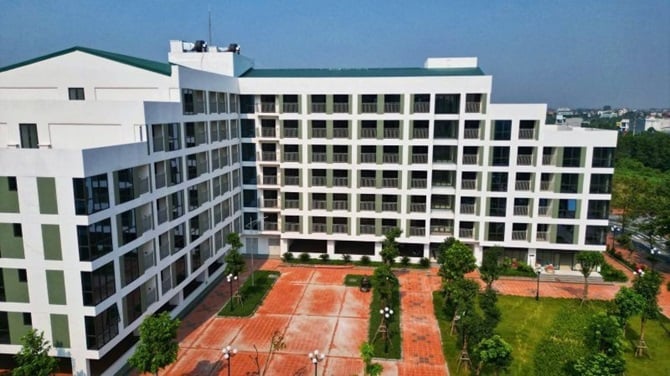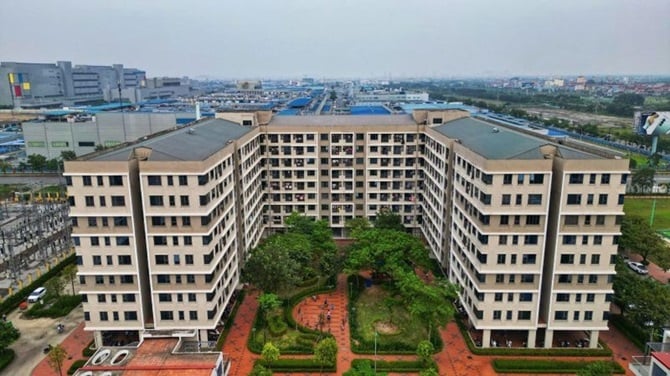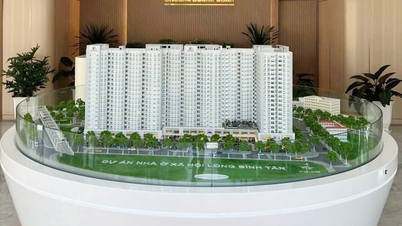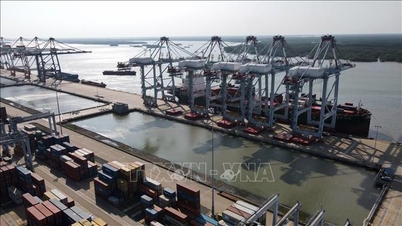
A comprehensive, long-term and effective strategy is needed in developing social housing. (Photo: PV)
To overcome the remaining challenges, the Vietnam Real Estate Brokers Association believes that a new way of thinking in management and operation is needed. Accordingly, social housing development is considered a mandatory task in the socio -economic development strategy of each locality, and is the responsibility of the State to lead instead of leaving it to the market mechanism.
Accordingly, only when social housing truly becomes an indispensable part of urban planning, is attractive to businesses, easily accessible to people, and has a stable operating mechanism, then the Project to complete at least 1 million social housing units will achieve high results, contributing to building a harmonious, humane and sustainable society.
Problems and issues in implementing social housing
In practice, after a series of policies, directions, supports and commitments, the implementation of the Project of 1 million social housing units still needs to be accelerated further. Specifically, the process of implementing social housing policies still reveals a number of shortcomings and limitations that have not been overcome or resolved.
Firstly, the land fund for social housing development is still limited. Many localities have not allocated reasonable land funds for social housing development. Some places have allocated land funds but lack infrastructure, which is not suitable for project implementation. Most investors have to find land funds and clear the site themselves, which is both costly and difficult to implement, pushing up costs and reducing the attractiveness of this segment. In addition, the lack of a mechanism to attract land funds from the private sector to participate in social housing development continues to be an unsolved barrier.
Second, the investment procedures and selection of social housing investors are still complicated. The procedures for approving investors and implementing social housing projects are not much different from those for commercial housing projects, and are even more complicated and are "scrutinized" more closely because they have to go through specific appraisal steps such as: approving selling prices and approving beneficiaries. At the same time, there is no mechanism for prioritizing, shortening procedures or designating suitable contractors to attract businesses to participate. Meanwhile, low profits lead to investors not being interested in participating in development.
Third, the capital source and credit mechanism for social housing are also not suitable. The development of social housing mainly relies on the equity capital of enterprises and banks through credit loans. Although there have been many efforts to reduce interest rates, the interest rate of the 120 trillion VND credit package for this special segment is still high, the term is short, not suitable for both investors and low-income homebuyers. In addition, there is no stable medium and long-term capital source from the budget, housing development funds, or trust funds to ensure sustainable investment for this segment.
New thinking is needed to overcome existing problems and limitations.
To resolve the existing problems, the Vietnam Real Estate Brokers Association believes that it is necessary to determine the leading role of the State and local authorities in ensuring all necessary and sufficient conditions to promote the development of social housing such as: Land fund, procedures, capital sources... In which, enterprises are identified as the subjects invited to participate in the implementation, creating conditions for them to apply their capacity and experience in developing social housing according to the programs established by the State and localities.

Identify the leading role of the State and local authorities in ensuring all necessary and sufficient conditions to promote the development of social housing. (Photo: PV)
Regarding land funds, localities need to plan and allocate specific and reasonable land funds for social housing development, and include this target in the 5-year and annual housing development program. It is necessary to apply the mechanism of land recovery, compensation for site clearance from the budget or in the form of BT, PPP, and land exchange for infrastructure to proactively create clean land funds. Encourage enterprises with available land funds to develop social housing through the mechanism of supporting land use purpose conversion and financial obligation exemption. At the same time, support the conversion of projects or project land funds that do not meet the needs into social housing.
Regarding investment procedures and investor selection, to encourage businesses to participate in social housing development investment, it is necessary to shorten the investment approval process, simplify investor selection procedures through a transparent and public bidding mechanism. Regulations on investor selection conditions should also be minimized to the most appropriate level, such as business conditions, capacity, capital sources and implementation experience. Apply post-inspection instead of pre-inspection for some non-core contents, cut down overlapping procedures, and prolong project approval time.
Regarding capital sources, it is necessary to build social housing development funds at the central and local levels, using land fund revenues, budgets, and contributions from enterprises and industrial zones. At the same time, it is necessary to promote the development of investment fund models and real estate trust funds targeting the social housing segment. In parallel, it is necessary to issue specific credit policies with low interest rates, long-term and flexible repayment periods for both investment enterprises and people buying or renting social housing.
Regarding local mechanisms, localities must proactively issue support policies appropriate to the specific needs of the actual situation: developing rental housing, diversifying models, and selecting the right target groups with real needs. Strengthening inspection, supervision, and strict handling of policy abuse, harassment, and difficulties in implementation.
Regarding output policies, it is necessary to be transparent and simplify procedures for determining beneficiaries, shifting from pre-inspection to post-inspection. There is a policy to support leasing - hire-purchase for groups of workers who do not have the financial capacity to buy a house. Build a national database system on social housing to ensure fairness, transparency and consistency in access.
Source: https://doanhnghiepvn.vn/kinh-te/phat-trien-nha-o-xa-hoi-doi-hoi-chien-luoc-toan-dien-dai-han-va-hieu-qua/20250911011359697


![[Photo] Prime Minister Pham Minh Chinh attends the World Congress of the International Federation of Freight Forwarders and Transport Associations - FIATA](https://vphoto.vietnam.vn/thumb/1200x675/vietnam/resource/IMAGE/2025/10/08/1759936077106_dsc-0434-jpg.webp)




![[Photo] Prime Minister Pham Minh Chinh inspects and directs the work of overcoming the consequences of floods after the storm in Thai Nguyen](https://vphoto.vietnam.vn/thumb/1200x675/vietnam/resource/IMAGE/2025/10/08/1759930075451_dsc-9441-jpg.webp)


































































































Comment (0)